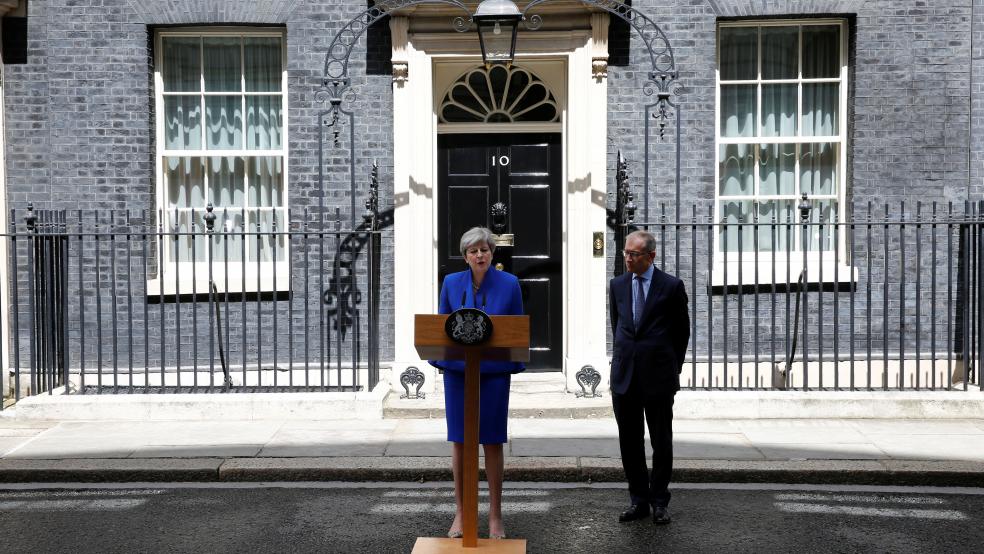It was far from the only factor that led to British Prime Minister Theresa May’s election setback on Thursday. But the Conservative Party’s ill-advised flirtation with a “dementia tax” proved to be an extraordinary blunder -- one that underscores the risks for any party that attempts to tamper with vital national health care programs.
Commentators say a multitude of factors led to the Conservative Party’s failure to win a majority of seats in the Parliamentary election. They ranged from May’s ill-advised decision to call a “snap” election two years before it was necessary to back-to-back terrorist attacks in the country to May’s own wooden demeanor and lackluster campaigning style.
Related: Long-Term Care: The Cost Challenge That Scares the Government Most
But by pressing for an austerity move that would come at the expense of hundreds of thousands of elderly citizens –- many of whom suffer from Alzheimer’s –- May and her Tory allies strayed into dangerous political terrain. Great Britain, like the United States and other major industrial countries, is groaning under the steadily mounting cost of long-term care for rapidly aging populations.
Just as President Trump and House and Senate Republican leaders in Washington are pressing for deep cuts in Medicaid and other health care programs to contain spending on nursing care and treatment for millions of elderly and disabled people, May and her cabinet concocted a governing “manifesto” to tighten spending in their country’s national health insurance program.
Research shows that within eight years, 2.8 million people over the age of 65 will require nursing and social care in Great Britain, a 25 percent increase over recent years. The British Office for Budget Responsibility estimates that public spending on long-term care for the elderly will rise from 1.2 percent of Gross Domestic Product to 1.7 percent of GDP by 2030.
One target in the Conservatives’ far-ranging manifesto was government care for the elderly. Because of a quirk in the law, elderly Brits with assets of more than $29,580 who reside in nursing homes must pay for all or part of their services and accommodations. Nursing home residents can defer their often sizable payments until after they die. That means they don’t have to sell a home or other assets to cover those costs while they are still alive or while a surviving partner lives in the house.
Related: Factbox: Should she stay or should she go? Conservative lawmakers on PM May
However, elderly people receiving treatment and assistance while still living in their own homes aren’t required to make payments to the government. The Conservatives vowed that if they were returned to office, they would alter the rule so that the elderly living at home would have to pay for their in-house care, and that the value of their homes would be included in their assets subject to liquidation after their death to cover their unpaid bills.
The Tories argued that what they proposed would equalize a patently unfair system and that, to boot, they would quadruple the assets or savings that anyone could protect to $127,424. “It is not fair that the quality of care you receive and how much you pay for it depends in large part on where you live and whether you own your own home,” the manifesto declared.
Some analysts who favored the change said the rule change would protect hundreds of thousands of the poorest elderly who would benefit from the higher asset threshold.
However, Labor Party leader Jeremy Corbyn, who led his party to an unexpectedly strong showing on Thursday, labeled the proposed rule change a “tax on dementia,” since many who need long-term care in their homes will now incur massive bills that will be deducted from the value of their homes and other property.
Related: Britain’s Tarnished Sterling: A Global Warning for Theresa May on Brexit
Corbyn accused May and the Conservatives of “forcing those who need social care to pay for it with their homes,” according to the British press. Many elderly had spent a lifetime acquiring a home and property, and bitterly resented the government’s attempt to prevent them from leaving their holdings to their children or heirs.
As May and her party steadily plummeted in the polls, the Conservatives did a U-turn on the issue and declared in a statement that “nothing has changed” since the release of their manifesto. But it was too late.
The party that once was counting on a tidal wave of support fell eight seats short of a majority in Parliament. On Friday, May rejected calls for her to step down and she vowed to form a new government with the help of a small, right-wing party in Northern Ireland.





